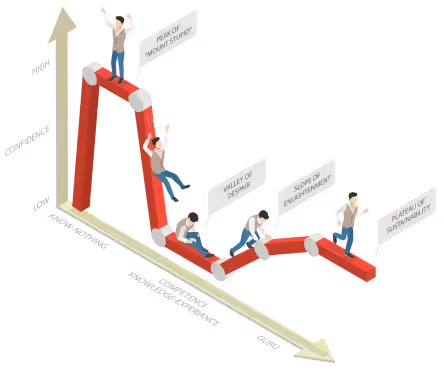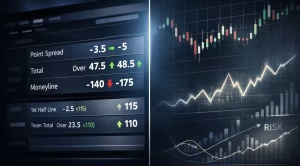Betting Confidence vs. Overconfidence: Finding That Sweet Spot

Confidence vs. Overconfidence makes all the difference — one draws people in, while the other can be off-putting and even harmful to success.
This sentiment can apply to a lot of life’s scenarios, but we are gonna talk about it in the context of betting.
You have to have confidence in your picks when you’re putting down real money! That’s a no-brainer. But if you get too big for your britches in this area, it will cost you money; you can bet on that.
There’s a super thin line between the two, and we are gonna go over why strategic confidence = good and why overconfidence = bad. Basically, you’re gonna learn how to check yourself before you wreck yourself.
What Is Betting Confidence?
Betting confidence just means that you have trust in your research, system, and instincts, and reasons to back up your bet.
It’s a belief in your betting decisions that’s grounded in facts and experience, not just a feeling or misguided hope. A confident bettor? They use logic, data, and discipline in every pick and make decisions that are based on analysis and not on emotion, exercising what experts call “emotional discipline.”
They are following reason, not their feelings. And they also accept losses as being part of the game, because they are. There is no strategy that wins every time, and a confident bettor recognizes that everyone has cold streaks. They don’t chase losses impulsively, they have a plan that they don’t deviate from, and they treat losses as a learning opportunity.
A level-headed approach means they can adjust without panicking: if something isn’t working, a confident bettor adapts their strategy; they don’t throw it in the garbage.
Real confidence means better decision-making and steady bankroll growth over the long run. By relying on evidence and maintaining discipline, confident bettors don’t fall into the traps of emotional betting, such as tilting or spur-of-the-moment, impulsive bets. They manage risk with good bankroll rules and consistent bet sizing, and that protects them from big losses.
And most importantly? Real confidence helps a bettor stay the course during the inevitable ups and downs; it mitigates the emotional impact of variance and losses, enabling one to persevere with a solid strategy despite any short-term setbacks.
What Is Overconfidence in Betting?
And then we have overconfidence. In betting? This is an inflated belief in your own ability to beat the odds, regardless of if you have an edge. An overconfident bettor thinks they’re smarter or luckier than everyone else, usually excessively convinced in their judgment or skills in spite of what the evidence supports. This mindset? It is an arrogant disregard for the very factors a confident bettor heeds. Instead of using logic and data, the overconfident gambler relies only on their gut feelings or a couple of wins as proof that they’re infallible.

We could go on and on about the traits of an overconfident bettor, but they boil down to these: a tendency to chase losses with bigger bets and aggressive moves.
If they’ve lost, their train of thought could sound like, “I’m way too good to lose two days in a row,” and then double their next wager to win it all back, and that’s a textbook sign of overconfidence bias.
Overconfident bettors also disregard the data or expert insight if it contradicts their opinions. They will ignore their own research or bankroll rules because they “just know” they’re right on a hunch.
In their mind? Short-term success proves long-term skill, and a few wins in a row can make them feel invincible. This is all tied to cognitive biases: one is the “hot-hand” fallacy, where someone mistakenly believes a streak of wins means they’re bound to keep on winning. Another is confirmation bias, where they only pay attention to the information that confirms their pre-existing belief in a bet and dismiss any warning signs. An overconfident sports fan? They’ll focus on a team’s recent winning streak and ignore their poor road record because it doesn’t fit with their narrative.
Main Differences: Confidence vs. Overconfidence
What’s the difference between real confidence and destructive overconfidence? Four main traits, and you see what those are in the table below:
| Trait | Confident Bettor | Overconfident Bettor |
|---|---|---|
Decision Basis | Data-driven bets are based on careful analysis of stats, trends, and value, which all fall into a solid betting strategy. | Gut-driven; bets are based on feelings, hunches, or a recent hot streak, and they ignore evidence that says otherwise. |
Risk Management | Follows strict bankroll rules and unit sizing; always stays within planned limits on every bet. | Regularly over-bets and deviates from a plan; will bet more than planned (or break staking rules) when they feel “sure” about a pick. |
Reaction to Losses | Takes losses personally or as flukes; often doubles down to “win back” losses or blames bad luck instead of adapting. | Regularly over-bets and deviates from a plan; will bet more than planned (or break staking rules) when they feel “sure” about a pick. |
View of Wins | Remains humble after wins; credits sound strategy but knows luck played a role. They keep success in perspective. | Feels invincible after a winning streak; assumes wins prove they have amazing skill and that future bets are “easy money.” |
As the comparison table shows, staying grounded is the key. A confident bettor stays objective and disciplined, makes decisions that are based on evidence, manages risk, and always learns. The overconfident bettor? They are operating on emotion and ego alone. They could have a couple of wins and conclude that they can do no wrong, betting larger and more carelessly. Or if they lose, they plain refuse to believe it was due to an error on their part, and will insist they are owed a big win and will chase it with even riskier bets. A lack of humility and risk control is what makes overconfidence so dangerous in betting!
The Psychology behind Overconfidence
Why do smart people fall into the overconfidence trap? Psychology has some explanations for it. One factor is the overestimation of personal skill vs. randomness.
Human beings are hardwired to find patterns and feel in control, and in betting, that can cause us to credit our skill for what is merely luck.
A 2021 study on gamblers found that when people played a pure game of chance (like a slot machine), most overestimated their “ability” at the game, unlike players of skill-based games. They had no control, but a lucky streak on a slot gave them the illusion they were doing something right. The illusion of control is a really common bias among gamblers. Bettors believe they can influence random outcomes or “have a system” to beat games of chance, but outcomes are all random.
Overconfidence feeds off of this illusion: if you think you’re in control, you’ll bet more than you should. Confidence means doing your research and making a clear call; overconfidence means thinking you can control something that is always random.
Another psychological driver is how we interpret short-term variance. A few lucky wins can create unrealistic optimism about future bets. The immediate dopamine hit of winning can fool you into thinking you’ve got this, and it’s just variance at work. This is why an initial hot streak can actually be so dangerous for a new bettor’s development; it may cause them to believe their knowledge or intuition is superior to everyone else’s (even the oddsmakers), and that only sets them up for failure.
And a string of losses can impair judgment if one heads to the opposite extreme (losing all confidence or recklessly trying to get even). Overconfident individuals have a hard time calibrating their expectations because they ignore the statistical reality of peaks and valleys. Sports outcomes always have a lot of randomness; even the best bettors have cold streaks, and a poor bettor gets lucky now and then. Failing to recognize this can warp a person’s long-term judgment.

Cognitive biases also play a big role, as does confirmation bias (favoring info that validates our beliefs). Another relevant bias? The Dunning-Kruger effect, which is the tendency for people with low ability in a domain to overestimate their competence.
Inexperienced bettors are really prone to this; they don’t know what they don’t know. Psychologists David Dunning and Justin Kruger found that novices often have inflated self-assessments, while real experts are more aware of the complexities and their own limitations. In sports betting, a newcomer who hits a few parlays might genuinely think they’ve mastered it; they really don’t realize the wins were mostly luck. A deficit of self-awareness means beginners can be overconfident precisely because they lack the experience to recognize their shortcomings. It’s a psychological one-two punch: the less you know, the more you think you know.
Lastly, overconfidence in betting can also be socially reinforced. The boasting of winners tends to make overconfidence seem normal or contagious. If everyone around you acts super sure of their picks, you could become more convinced of your own. And if you surround yourself with only those who agree with you? It’s not a big leap to becoming over-sure.
Real Examples: When Overconfidence Went Wrong
It’s super common to see confidence spill over into overconfidence with costly results. Let’s look at a couple of scenarios (composite but informed by real-world patterns) that show how quickly momentum can turn:
Example 1
A sports bettor has a great weekend, correctly picking three NFL games in a row. Flushed with success, he decides on Sunday night to double his usual bet size for the Monday game because he’s “on fire.” Without a lot of research, he throws a big chunk of his bankroll on a heavy favorite, convinced it’s easy money. Unfortunately, the favorite not only fails to cover the spread, but they also lose outright. His one overconfident bet wipes out all the profits from the prior three wins and then some. This bettor fell victim to the classic “hot hand” overconfidence: a short winning streak made him feel invincible, leading to a reckless wager. Had he stuck to his normal unit size and strategy? The upset loss would have been just a minor setback. But overconfidence turned it into a major blow.
Example 2
A casino player is a few hands into a blackjack session and hits a couple of lucky wins. Feeling unbeatable, they start using a progressive betting strategy, meaning they double their bet after each loss, because they believe there’s no way they’ll keep losing (“I can’t lose, I’m due to win any hand now!”). This is the Martingale system, and it works for a short while during the mini winning streak. But then a cold run happens, and the player loses several hands in a row. Doubling the bets each time, they rapidly reach bets of hundreds of dollars and soon max out their budget (or the table limit). In the end, one extended losing streak wipes out all their prior winnings and empties their bankroll for the night. This example shows how overconfidence in “surely I won’t lose again” can backfire spectacularly. The Martingale-style progressive betting felt like a can’t-lose tactic in theory, but in reality, its flawed logic became clear as soon as a statistically normal losing streak occurred; the exponential bet size growth bankrupted out unlucky imaginary gambler.
The above hypothetical scenarios underscore just how quickly fortune can reverse when you get overconfident. A few wins can create a false sense of security, prompting bets or strategies that expose you to huge risk. By the time the overconfident bettor realizes what’s happening, it’s usually too late; the money is gone. As the saying goes, “Bulls make money, bears make money, but pigs get slaughtered.” In betting, those “pigs” are the overconfident players who push their luck too far.
How to Measure and Monitor Your Confidence
Given the fine line between confidence and overconfidence, how can you keep yourself in check? Here are some practical ways to measure and monitor your confidence level while betting:
Keep a Detailed Betting Journal
Tracking your bets is not only about the numbers; include your thought process and emotions for each wager. Note why you made the bet, how confident you felt (e.g., on a 1–10 scale), and the outcome. This journal becomes invaluable for self-reflection.
You could notice that your “10/10 confidence” bets didn’t perform any better than your “6/10” bets, and that’s a clue that you are overestimating your edge.
Writing down your reasoning also forces you to articulate whether a bet is grounded in facts or just a hunch. By maintaining a log of every wager (stake, odds, result, etc.), you can analyze patterns and see if overconfidence is creeping in. Did you start increasing your bet sizes after a hot streak? Are you deviating from your strategy when you feel sure about a play? A thorough record will tell you!
Use a Confidence Rating for Each Pick
As we said, rating your confidence in a bet on a scale (say 1 to 10) before placing it can be a solid self-check. Write why you feel that way. “8/10 – the stats and matchup strongly favor the home team” is a good rationale. “10/10 – this is a lock, I just feel it” is a red flag. After the games, compare your confidence ratings with actual results. Are your 9/10 bets winning at a very high rate? If not, it shows you could be overconfident in your predictions. Calibrating your subjective confidence to reality is a skill! If you say you’re 70% confident in 10 different bets, ideally, 7 of them will win. If far fewer win, you know your confidence was misplaced.
Watch for These Mental Red Flags
Be honest with yourself about your self-talk and thoughts while betting. Certain phrases or feelings can signal tipping into overconfidence. If you catch yourself thinking things like:
- “I know this one will hit.” – (Do you really? No bet is ever guaranteed. This thought often precedes an overconfident wager.)
- “I’m due for a win.” – (A classic gambler’s fallacy; prior losses don’t make a future win any more likely.)
- “I’ve cracked the system here.” – (If you believe you found a foolproof betting system, be very cautious – markets evolve, and this mindset can blind you to new information.)
When these thoughts happen, check yourself. They usually indicate emotion or ego talking, not sound analysis. Implement a rule for yourself: if you feel 100% certain about a bet, that’s exactly when to double-check your reasoning (because overconfidence might be warping your perception). In sports and gambling, there is no such thing as a sure bet; the best teams lose, huge upsets happen, and expert handicappers hit a slump.
Use Third-Party Input or Tools
Sometimes it’s really hard to objectively assess your own confidence. Engaging with a betting community or a more experienced mentor can be super helpful! You can share your reasoning on a forum or with a friend and see if others poke holes in it. Be really careful not to fall into the trap of only seeking agreement (confirmation bias); you should invite critique. There are also tools that can quantify the “confidence” of a bet, like implied probabilities vs. your estimated probabilities, and comparing those can tell you if you’re being too optimistic. Find ways to get outside your own head and view your bets more objectively!
How to Build Healthy Betting Confidence
Building healthy confidence in betting means developing trust in your process without veering into arrogance. How can you manage that feat? By practicing the following:
- Stick to data-driven analysis: Ground your picks in research and statistics. Look at team/player stats, odds history, injuries, weather, whatever is relevant to the bet, and base your decision on that evidence. Bettors who rely on data and understand probabilities tend to make better choices, whereas those going purely on gut feeling are prone to error. When you’ve done the homework, you can be confident for a reason. This kind of confidence is way stronger than a hunch, even if the bet loses? You know it was a smart play on paper.
- Develop a tested strategy (and trust it): It’s easier to be confident if you have a clear betting strategy or system that you’ve tested over time. This could be a particular handicapping method, a model, or a bankroll management approach. The key is to practice it and prove it out (even in paper trading or small stakes) before scaling up. Once you have evidence that your strategy has an edge, trust it. Consistency is a must; jumping from one approach to another at the first sign of trouble undermines confidence. A confident bettor sticks to their plan during the inevitable rough patches, knowing that short-term losses don’t mean the strategy is doomed. By contrast, an overconfident person might abandon a strategy on a whim because they believe their “feel” is better. Build your strategy, test it, and then let it work over the long haul.
- Reflect and learn after each session: Make it a habit to review your betting performance regularly. After a day or week of betting, go back through your wagers: Which ones won or lost, and why? Did you make any emotional decisions? Were there signs you ignored? By analyzing wins and losses with a cool head, you turn each outcome into a lesson. This reflection process reinforces good habits and corrects bad ones, gradually boosting your confidence in your decision-making. For instance, you might realize that whenever you rushed a bet right before kickoff, it tended to be a poor choice, so you learn to avoid those situations. Or you might confirm that your most confident picks (with solid rationale) did perform well, validating your approach. Continuous improvement keeps your confidence earned and in check.
- Stay humble and seek accountability: True confidence isn’t about thinking you’re the best; it’s about being secure enough to acknowledge weaknesses. Engage with other bettors or communities not for picks, but for accountability and perspective. Discussing bets with more experienced bettors can reveal blind spots in your reasoning. They might challenge you on a pick, forcing you to defend it with facts (or reconsider if you can’t). Surrounding yourself with a culture of smart betting can keep ego in check. Additionally, practice saying “I was wrong” when a bet loses due to a flawed premise – it sounds simple, but many bettors instead blame luck or external factors. Admitting mistakes is liberating and fortifies your future confidence because you know you’re capable of recognizing and fixing errors. The goal is to be confident, not cocky, so always respect the betting game and the fact that there’s always more to learn. As the proverb goes, “Pride comes before a fall.” Replacing pride with curiosity and discipline will build up confidence that’s resilient but also flexible.
Best Practices for Staying in the Sweet Spot
To maintain that ideal middle ground between confidence and overconfidence, aka the “sweet spot,” you can put these tips into practice when you’re betting!
A good trick is only to bet when your confidence in a pick is above a certain level for well-founded reasons. You could decide that you’ll only wager on a game if you can articulate why it’s at least a 7 out of 10 in confidence for you. If a potential bet is, say, a 5/10 where you’re mainly guessing, skip it. This helps you avoid low-conviction bets made out of boredom or chasing action. The main thing is that your confidence rating has to be backed by rationale (matchup edges, line value, etc.), not only “feel.” When you enforce a threshold, you make sure that you’re investing money only when you have a solid basis, and it’s a practice that naturally keeps overconfidence in check. It also forces introspection: why do I feel confident in this bet? If you can’t answer that? You definitely shouldn’t be betting on it.
Structure your bets in terms of units (a fixed percentage of your bankroll) and resist the urge to vary your bet sizes wildly. A lot of sharp bettors use flat betting or a limited unit scale (e.g., 1 to 3 units maximum on strongest plays). This approach prevents overconfident splurges because even when you feel amazing about a bet, you’re still only staking a responsible portion of your bankroll. Sticking to a consistent unit system is a proven way to impose discipline. It ensures that one or two bets won’t ruin you, and it removes the temptation to “go all in” on a hot tip. By capping how much extra you wager even when confident, you guard against the occasional bad decision that every human is susceptible to. In short, let your staking plan, not your ego, dictate bet sizes.
Winning and losing streaks are when you’re at the most vulnerable to exiting out of the sweet spot. After a winning streak, confidence is soaring, and that’s when you should take a break or at least a return to normal bet sizes if you were scaling up. There are bettors who impose a rule on themselves: after X number of wins in a row, they’ll take the next day off or limit the next bet to average size.
A cooling-off period helps prevent the snowball of overconfidence from turning into a huge mistake. And after a bad losing streak? Your impulse may be to win it all back (or you might lose confidence entirely). A break is good, too! Walk away, clear your head, and remind yourself of your process instead of making another bet while you’re emotionally charged. Streaks end either naturally or via your intervention. When you proactively pause after a hot or cold run, you make that’s that you reset your mindset to baseline and come back with measured confidence and not reactive emotion.
The betting landscape is dynamic; lines move, teams evolve, and what worked last season may not work now. To stay in the sweet spot, treat your perceived “edge” with some skepticism and reassess it periodically. Ask yourself if you still have an edge in this market? Has my recent performance backed that up? If not, adopt.
It could be updating your models, looking for new information sources, or specializing in a different niche. It takes a lot of humility to admit that what you thought was an edge might have been variance or has eroded over time. The best bettors are perennial students; they continuously gather knowledge and refine their approach, acknowledging that there’s always room to improve.
Knowing your limitations is vital to avoid overconfidence. Paradoxically, the more you learn, the more confident you can be. Why? Because your confidence will be justified by actual competence. Staying curious and coachable will keep your confidence calibrated and prevent the kind of complacency that leads to overconfidence.
Bet Smart, But Stay Humble
Successful betting is a delicate balancing act between conviction and caution. Yes, it pays to be a little bolder when you have an advantage, but it’s just as important to stay humble when you aren’t sure.
As psychologists like to say, the ideal mindset is finding your “Goldilocks Zone,” which is where your confidence is neither too hot nor too cold, but calibrated “just right!” Bettors who operate in this zone make smart, measured choices with the goal of long-term profit without taking on unnecessary risk. They don’t freeze up from fear, but they also never assume they can’t lose!
Here’s a quick recap on finding that sweet spot between confidence and overconfidence:
- Confidence is great, but it has to be grounded in discipline, research, and a solid strategy. The right level of confidence keeps you decisive during the ups and downs of betting, and you respect the risks and stay data-driven in your approach.
- Overconfidence is dangerous, as it causes riskier bets and emotional decisions. When you believe you have a “sure thing” or that you’re untouchable after a few wins, you’re entering dangerous territory. This mindset causes people to ignore sound strategy and can quickly erode any bankroll advantage.
- Track your mindset and stay objective: Monitor your betting habits, record your decisions, and give yourself reality checks. Use tools like a betting diary or feedback from peers to suss out any signs of bias. When you seek out objective evidence and stick to a proven plan? You can keep your judgment clear and not fall into the overconfidence trap.

Alyssa contributes sportsbook/online casino reviews, but she also stays on top of any industry news, precisely that of the sports betting market. She’s been an avid sports bettor for many years and has experienced success in growing her bankroll by striking when the iron was hot. In particular, she loves betting on football and basketball at the professional and college levels.








